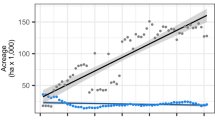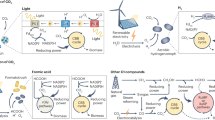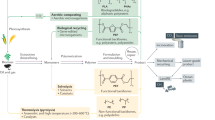Abstract
THE formation of the Scottish Seaweed Research Association last year stimulates one to inquire into the somewhat chequered history of what is known as the kelp industry. At one time this assumed considerable importance in Europe and afterwards spread to the United States and Japan, the last-named country producing in 1929 some 7 per cent of the world's iodine entirely from seaweeds. The word 'kelp' itself properly refers to the burnt ash of seaweed, but has since been extended to include the living plants.
This is a preview of subscription content, access via your institution
Access options
Subscribe to this journal
Receive 51 print issues and online access
$199.00 per year
only $3.90 per issue
Buy this article
- Purchase on Springer Link
- Instant access to full article PDF
Prices may be subject to local taxes which are calculated during checkout
Similar content being viewed by others
References
Cauer, H., Biochem. Z., 299, 69 (1938).
Stanford, E. C., J. Soc. Arts, 10, 185 (1862).
Delf, E. M., Nature, 152, 149 (1943).
Author information
Authors and Affiliations
Rights and permissions
About this article
Cite this article
CHAPMAN, V. The Kelp Trade. Nature 155, 673–674 (1945). https://doi.org/10.1038/155673a0
Issue Date:
DOI: https://doi.org/10.1038/155673a0
Comments
By submitting a comment you agree to abide by our Terms and Community Guidelines. If you find something abusive or that does not comply with our terms or guidelines please flag it as inappropriate.



